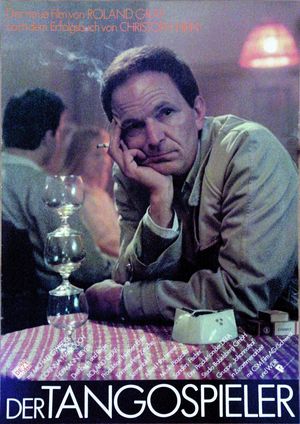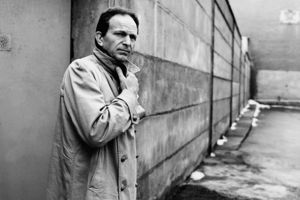Der Tangospieler
Director: Roland Gräf, 96 Min., Color, Feature Film
Bundesrepublik Deutschland (BRD); Deutsche Demokratische Republik (DDR); Schweiz
DEFA-Studio für Spielfilme / Westdeutscher Rundfunk (WDR), Köln / CSM Film AG, Schweiz, 1990
- Film/Video Format
- 35 mm
- Length in m
- 2631
- English Title
- The Tango Player
- Premiere Date
- Release Date (for Cinema)
- Literary Source
- Hein, Christoph: "Der Tangospieler", Erzählung

(Dir.: Roland Gräf, 1990)
Short Summary (English)
Hans-Peter Dallow has to go to prison for two years after playing the piano accompaniment for an "undesirable" Tango. The senior scientific assistant is sentenced "in the name of the people" by a COR court. Following his eventual release from prison in 1968, he is not prepared to conform to the mechanisms of everyday routine at university Dallow's feelings have been deeply hurt and he feels insecure. He tries his level best to find work, but all efforts fail. Instead, two gentlemen offer him work at State Security. But Dallow turns it down. He is plunged into a deep depression, not least because he is unable to cope with his intelligent and independent partner, Elke, and because he constantly gets involved in rows with his parents. He even flies at the judge in his trial, making the whole situation much worse. He finds temporary work as a waiter on the island of Hiddensee, where later, the news gets to him that he may take up his university post again. Worn down by his futile jobhunting, Dallow now signs the contract, thereby putting his predecessor in the very situation he is now escaping from with his signature.
Source: Progress Film-Verleih

(Dir.: Roland Gräf, 1990) Photography: Christa Köfer

(Dir.: Roland Gräf, 1990) Photography: Christa Köfer
Film Crew
- Director
-
- Roland Gräf
- Script
-
- Roland Gräf
- Camera
-
- Peter Ziesche
- Film Editing
-
- Monika Schindler (geb. Behrendt)
- Cast
-
- Michael Gwisdek (Hans-Peter Dallow)
- Corinna Harfouch (Elke)
- Hermann Beyer (Dr. Berger)
- Peter Prager (Roessler)
- Peter Sodann (Schulze)
- Reiner Heise (Müller)
- Jaecki Schwarz (Harry)
- Anne Kasprzik (auch: Kasprik) (Sylvia)
- Gunter Schoß (Kiewer)
- Ilona Schulz (Barfrau)
- Katka Kurze (Margarete)
- Christine Harbort (Barbara)
- Jörg Simonides (Klufmann)
- Jeanine Burch (Therese)
- Klaus Glowalla (Dallows Vater)
- Ruth Glöss (Dallows Mutter)
- Jürgen Zartmann (Der Blonde)
- Hilmar Baumann (Kaderleiter III)
- Marylu Poolman (Kaderleiterin IV)
- Harry Merkel (Kaderleiter II)
- Erich Thiede (Kaderleiter I)
- Annette Büschelberger (Dunkelblonde)
- Michael Kind (Beates Mann)
- Katrin Klein (Beate)
- Günther Kornas (Beamter)
- Wilfried Loll (Rotblonder)
- Bodo Krämer (Sebastian)
- Wolf-Dietrich Köllner (Tümmler)
- Ute Loeck (Gerda)
- Winfried Wagner (Dallow, 6 Jahre)
- Christian Hilpert (Dallow, 14 Jahre)
- Heike Wegner (1. Tochter)
- Edina Gabowski (2. Tochter)
- Hans-Joachim Finke (Dienstreisender)
- Magne Håvard Brekke (Junger Mann)
- Martin Olbertz (Kabarettist)
- Lutz-Michael Ranz (Kabarettist)
- Heike Jonca (Junge Frau)
- Sabine Namislo (Eine Frau)
- Karin Röhr (Eine Frau)
- Eckhart Strehle (Koch)
- Claudia Jacob (Karla)
- Werner Dissel (Eisenbahner)
- Marcus Schmidt (Mann A)
- Gunnar Teuber (Mann B)
- Antje Weber (Irene)
- Rudolf Spade (Gaststättenleiter)
- Edmund Raatz (Gast)
- Günther Fischer (Pianist)
- Hannelore Shantin (Klavierlehrerin)
- Peter Berger (Tänzer)
- Karl Maschwitz (Tänzer)
- Ursula Fischer-Maschwitz (Tänzerin)
- Ramona Gierth-Berger (Tänzerin)
- Zdzislaw Ciupek (Gast)
- Assistant Director
-
- Hanna Seydel
- Assistant Camera
-
- Christa Köfer
- Frank Bredow
- Production Design
-
- Alfred Hirschmeier
- Script Editing
-
- Gabriele Herzog
- Music
-
- Günther Fischer
- Astor Piazzolla ("Pulsacion n. 4")
- Julio C. Sanders (Tango "Adios Muchachos")
- Sound
-
- Hans-Henning Thölert
- Christfried Sobczyk (Tonmischung)
- Musical Performance
-
- Klaus-Peter Hermann (Gesang (Tango))
- Costume Design
- Make-Up
-
- Lothar Stäglich
- Rosemarie Stäglich (geb. Wittke)
- Props
-
- Georg Wüstenberg
- Production Management
-
- Herbert Ehler
- Unit Production Management
-
- Horst Schmidt
- Kai-Uwe Blümel
- Content Editing
-
- Wolf-Dietrich Brücker (WDR)
- DEFA Photography
-
- Christa Köfer
Awards
- IX. Internationales Filmfestival Bergamo/Italien (07.-14.07.) (1991): 1. Preis - die goldene "Rosa Camuna"
- Deutscher Filmpreis (1991): Filmband in Gold als bester Schauspieler an - Michael Gwisdek
- Deutscher Filmpreis (1991): Filmband in Silber für den Film
Short Summary (German)
Nach einundzwanzigmonatiger Haft wird der Historiker und Gelegenheits-Pianist Dr. Hans-Peter Dallow entlassen. Verurteilt wurde er, weil er ein Kabarettprogramm mit "staatsverleumderischen" Texten am Klavier begleitet hatte. An die Leipziger Universität, wo er Oberassistent war, will er nicht zurück, doch Arbeit findet er keine. Zwei Herren tauchen bei ihm auf und wollen ihn an die Universität zurückbringen - als Gegenleistung verlangen sie Spitzeldienste. Dallow lehnt ab. Er lebt - weitgehend isoliert - von seinen Ersparnissen. Die anderen wollen von seinen Problemen nichts wissen. Er gerät in eine Identitätskrise. Seine Freundin Elke möchte, daß er zu einem normalen Leben zurückkehrt. Als das Kabarettprogramm, das ihn ins Gefängnis brachte, freigegeben wird und selbst sein damaliger Richter sich amüsiert, geht Dallow ihm an den Kragen. Danach nimmt er eine Stelle als Kellner auf Hiddensee an. Es ist Sommer 1968, die Truppen des Warschauer Pakts marschieren in die CSSR ein. Auf Hiddensee taucht eine Abgesandte der Universität auf und bietet Dallow eine Dozentur an. Dallow arrangiert sich, er geht zurück und unterschreibt den Vertrag.
(Quelle: Das zweite Leben der Filmstadt Babelsberg. DEFA-Spielfilme 1946-1992)
Short Summary (Other Languages)
Dopo 21 mesi di prigione, per aver suonato durante uno spettacolo "vilipendioso" di cabaret, il Dr. Hans-Peter Dallow, storico e appassionato pianista, torna in libertà, ma si si rifiuta di tornare all'università di Lipsia, dove era assistente, anche quando due uomini gli offrono una cattedra in cambio di qualche servizio di spionaggio. Non trovando altro lavoro, Dallow conduce una vita ritirata, vivendo dei suoi risparmi, ma i troppi problemi sfociano in una crisi d'idenità. Quando anche la fidanzata Elke lo prega di condurre una vita normale, lo storico accetta di lavorare come cameriere sull'isola di Hiddensee. Nell'estate del 1968 le truppe del patto di Varsavia entrano nalla CSSR. Sull'isola di Hiddensee si presenta un rappresentante dell'università, che offre a Dallow una cattedra. Questa volta accetterà l'offerta, sottoscrivendo il contratto. (Italienisch)
Par une froide journée d'hiver de l'année 1968, Dr. Dallow sort de prison. Il lui a fallu passer 21 mois sous les verrous pour avoir accompagné au piano un tango dont les paroles sont suspectes de diffamation contre l'état, au cours d'une soirée de variétés organisée par les étudiants. Dallow part pour Leipzig, la ville où il habitait avant son procès et où il était assistant en histoire á l'université. Le soir-même de son arivée. il se rend dans son café familier. Il refuse toute réintégration dans la société après l'injustice qu'il a subie. Messieurs Schulze et Müller, qui lui rendent visite peu de temps après, sont d'un tout autre avis. Ils veulent intervenir pour que Dr. Dallow retourne à l'université en échange de quoi il devra leur servir d'agent indicateur. Evidemment, Dallow refuse bien que ces messiuers fassent toujours davantage pression sur lui. Si Dallow ne vaque pas régulièrement à un travail dans un proche avenir, il devra se justifier de son comportement asocial. Et mêmes s'il le voulait, il n'aurait aucune chance à l'université. Roessler, un ancien collègue qui occupe le poste de maître de conférences qu'aurait dû avoir Dallow, laisse entendre que l'on ne peut imposer aux étudiants un ancien criminel. Le jour de l'invasion de la Tchécoslovaquie par les troupes du Pacte de Varsovie, il recoit la visite de Sylvia, une de ses anciennes étuiantes, qui est maintenant assistante á l'université. Sylvia soumet à Dallow une proposition suprenante. Il est censé reprendre le poste de Roessler qui est suspendu sans délai de ses fonctions. Dallow est prêt à reprendre immédiatement son travail à l'université. Sur la route de Leipzig il est doublé par les colonnes des soldats. (Französisch; source: 41. Internationale Filmfestspiele Berlin 1991 Dokumentation)



